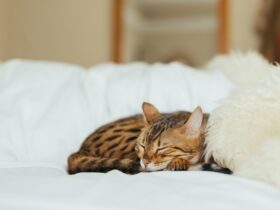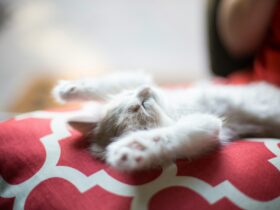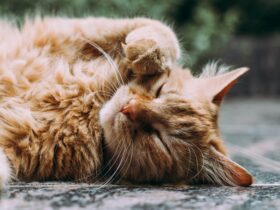Blog: Persian Cat Breed Information & Characteristics | 8 Reasons Why Your Cat Is Losing Weight and What to Do
Introduction
If you’ve noticed that your Persian cat is losing weight, it’s important to understand the potential causes and take appropriate action. Weight loss in cats can be a sign of an underlying health issue and may require prompt attention to ensure your feline friend’s well-being. This blog will explore eight common reasons why your Persian cat might be losing weight and provide guidance on what you can do to address each issue.
1. Poor Diet and Nutrition
Description
- Imbalanced Diet: Cats on a diet lacking essential nutrients may experience weight loss. An inadequate diet can result from feeding low-quality food or improper portions.
- Inadequate Calories: If your cat’s caloric intake is insufficient, it may lose weight despite eating regularly.
What to Do
- Evaluate Diet: Ensure your cat is eating high-quality, balanced cat food that meets their nutritional needs. Look for foods that are rich in protein and fat.
- Consult a Vet: Discuss your cat’s diet with your veterinarian. They can recommend appropriate dietary adjustments or supplements.
- Increase Calories: If necessary, switch to higher-calorie cat food or add high-calorie supplements to your cat’s diet.
2. Medical Conditions
Description
- Chronic Illnesses: Weight loss can be a symptom of chronic conditions such as diabetes, kidney disease, or hyperthyroidism.
- Acute Illnesses: Infections, gastrointestinal issues, or cancers can also lead to significant weight loss.
What to Do
- Veterinary Examination: Schedule a thorough check-up with your vet to identify or rule out any underlying medical conditions.
- Diagnostic Tests: Your vet may recommend blood tests, x-rays, or other diagnostics to determine the cause of the weight loss.
- Follow Treatment Plans: Adhere to your vet’s treatment recommendations, including medications or special diets tailored to your cat’s condition.
3. Dental Problems
Description
- Painful Mouth: Dental issues, such as gingivitis, tooth decay, or oral infections, can make eating painful and lead to weight loss.
- Difficulty Eating: Cats with dental problems may have trouble chewing and may avoid food altogether.
What to Do
- Check Oral Health: Regularly inspect your cat’s mouth for signs of dental issues, such as bad breath or swollen gums.
- Veterinary Dental Care: Consult your vet for a dental examination and professional cleaning if necessary.
- Provide Soft Foods: Offer soft or canned food to make eating easier if your cat is experiencing dental discomfort.
4. Parasites
Description
- Internal Parasites: Worms and other internal parasites can lead to weight loss by causing malnutrition and poor absorption of nutrients.
- External Parasites: Fleas and other external parasites can also affect a cat’s health and weight.
What to Do
- Parasite Check: Have your cat examined for parasites by your vet.
- Deworming: If internal parasites are detected, follow your vet’s recommendations for deworming treatments.
- Flea Control: Use recommended flea prevention products to keep external parasites at bay.
5. Stress and Anxiety
Description
- Environmental Changes: Changes in the cat’s environment, such as moving to a new home or the introduction of new pets, can lead to stress and appetite loss.
- Behavioral Issues: Stress-related behavioral problems can affect eating habits and lead to weight loss.
What to Do
- Create a Stable Environment: Minimize disruptions and provide a secure, quiet space for your cat.
- Monitor Behavior: Watch for signs of stress or anxiety and address any potential sources of stress.
- Consider Calming Aids: Use calming products or pheromone diffusers if your cat is particularly anxious or stressed.
6. Aging
Description
- Natural Decline: As cats age, their metabolism can slow down, and their ability to absorb nutrients may decrease, leading to weight loss.
- Health Declines: Older cats are more susceptible to chronic conditions that can affect their weight.
What to Do
- Regular Vet Check-Ups: Schedule regular veterinary visits to monitor your older cat’s health and address age-related issues.
- Senior Cat Diet: Provide a diet formulated for senior cats, which often includes nutrients tailored to their needs.
- Monitor Weight: Keep track of your cat’s weight and adjust their diet as needed to maintain a healthy weight.
7. Gastrointestinal Issues
Description
- Digestive Disorders: Conditions like inflammatory bowel disease (IBD) or gastritis can interfere with nutrient absorption and cause weight loss.
- Vomiting and Diarrhea: Persistent gastrointestinal symptoms can lead to weight loss through malnutrition and dehydration.
What to Do
- Vet Examination: Have your cat examined for gastrointestinal issues and undergo diagnostic tests if needed.
- Special Diets: Your vet may recommend a special diet to manage digestive disorders and improve nutrient absorption.
- Medication: Follow your vet’s recommendations for treating gastrointestinal issues with medication or supplements.
8. Hormonal Imbalances
Description
- Hyperthyroidism: An overactive thyroid can increase metabolism and lead to weight loss.
- Diabetes: Diabetes can affect a cat’s weight by altering glucose metabolism and appetite.
What to Do
- Hormone Testing: Have your cat tested for hormonal imbalances by your vet.
- Treatment: Follow your vet’s treatment plan for managing hormonal conditions, which may include medications or insulin injections.
- Dietary Adjustments: Your vet may recommend dietary changes to help manage hormonal imbalances and support weight gain.
Conclusion
Weight loss in Persian cats can result from a variety of causes, ranging from dietary issues to serious medical conditions. By understanding these potential reasons and taking appropriate actions, you can help your cat regain and maintain a healthy weight. Regular veterinary check-ups, a balanced diet, and proper medical care are essential in addressing and preventing weight loss in your Persian cat.











Leave a Reply